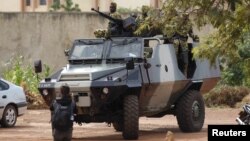The leader of last week's coup in Burkina Faso has apologized to the country and says he is planning to hand over power to a civilian government.
In a statement Monday, General Gilbert Diendere, said he will step down as the country's de facto leader at the conclusion of talks mediated by the Economic Community of West African States (ECOWAS). The regional group is holding an emergency summit in Nigeria's capital Tuesday to discuss the situation.
General Diendere, head of the presidential guard which seized power last Wednesday, told VOA's French to Africa Service on Monday that he wants to avoid bloodshed.
The general said former Burkinabe president Jean-Baptiste Ouedraogo is serving as a go-between in the talks.
Diendere also said the junta is allowing for the release of the interim prime minister who has been under house arrest since the coup.
Earlier, Burkina Faso's army said its troops were moving toward the capital, Ouagadougou, with the goal of disarming the presidential guard, known as the RSP.
Spokesman Captain Herve Ye told VOA (French to Africa Service) that the army wants the presidential guard to surrender and move to a base near Nation's Square, a public gathering place in the capital.
A reporter for VOA in Ouagadougou, Emilie Iob (pronounced Yob), said the streets of the capital have emptied out as word spreads that the army is coming.
The RSP overthrew Burkina Faso's transitional government last Wednesday, less than a month before elections. Diendere said the polls were "biased," because supporters of former president Blaise Compaore were barred from running.
Compaore ruled Burkina Faso for 27 years before being ousted in a popular uprising last year, when he tried to change the constitution to extend his presidency.
Protests against the coup turned violent, killing at least 10 and injuring more than 100.
West African negotiators announced a plan Sunday to restore civilian authority but offer amnesty to the coup leaders. Under the plan, the elections originally set for October 11 would be held sometime before November 22.
Monday, a U.N. spokesman said Secretary-General Ban Ki-moon is following the situation with great concern, and calls on both the military and presidential guard to exercise restraint and avoid violence.




